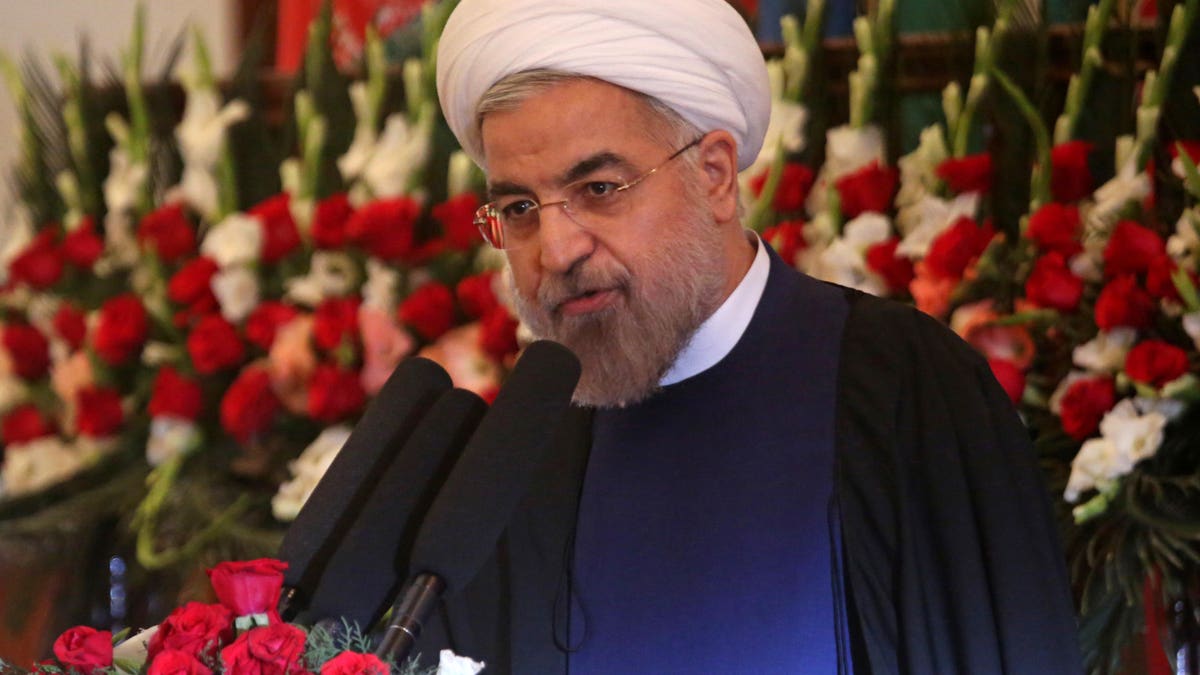
Iranian President Hasan Rouhani speaks during a ceremony celebrating the Persian New Year, Nowruz at the presidential palace in Kabul, Afghanistan, Thursday, March 27, 2014. In his first visit to Afghanistan as Iran's president, Rouhani has called for regional unity while at the same time saying international forces brought "destruction" to Afghanistan. (AP Photo/Massoud Hossaini)
At a time when the West would like to think its negotiating partner is adopting a new, softer tone, Iran’s executions have only increased over the past year, according to a report by the Human Rights and Democracy Report.
No matter how many times leaders meet with Iranian officials in Vienna in an attempt to draw a deal on the country’s nuclear weapons program, the report, put out by the Foreign and Commonwealth Office in the UK, suggests the number of executions and the country’s horrific human rights record speak to an unchanging and even emboldened Iranian regime.
Since Iran’s President Hassan Rouhani, who ran for office as a moderate, took office last August, the number of executions has actually increased.
More than 537 executions have taken place since his election, with nearly 200 coming this year, according to the Iran Human Rights Documentation Center.
The total number of executions for 2013 was at least 624, with many known to have taken place secretly.
The United Nations, which has put out a report regarding these executions, has also had several of its branches, as well as UN Secretary General Ban Ki-Moon, speak out about the surge.
In February, the UN Human Rights office called on Iran to immediately halt executions, noting that in just the first seven weeks of 2014, almost 100 Iranians had been executed for minor crimes and did not meet international standards for which the death penalty may be implemented.
Since coming into power, the Islamic Republic of Iran, which deposed Iran’s Shah in the Iranian Revolution of 1979, has used capital punishment as a way to quiet dissidence and control the government reins.
Iran has long run second only to China in the number of citizens executed each year, according to Amnesty International. And given China's much higher population, Iran's per capita rate far outstrips all other nations.
The report by the FCO also found there was no improvement in Iran’s treatment of its religious minority groups and in particular focused on the persecution of Baha’s and Christians in the country. The report said government officials are arresting, torturing and restricting education and employment opportunities of Baha's. The targeting of Christians, particularly those practicing in house churches, underground places of worship for Christian converts, was mentioned in the report.
The Iranian government is still holding American Pastor Saeed Abedini, a Christian convert and American-Iranian dual citizen, in one of its most brutal prisons for practicing his faith. Lawmakers and human rights groups have been calling out for Abedini’s release and appeal of an eight-year prison sentence.
Last fall, President Obama also called for Abedini’s release in a historical call to President Rouhani.
Iran is also holding two other Americans: former FBI Agent Robert Levinson and former U.S. Marine Amir Hekmati.
Levinson recently became the longest-held hostage in U.S. history. He has been missing since 2007 and the Iranian government has refused to disclose his whereabouts.
Hekmati, an American citizen, was convicted of espionage while visiting his grandmother in Iran.







































